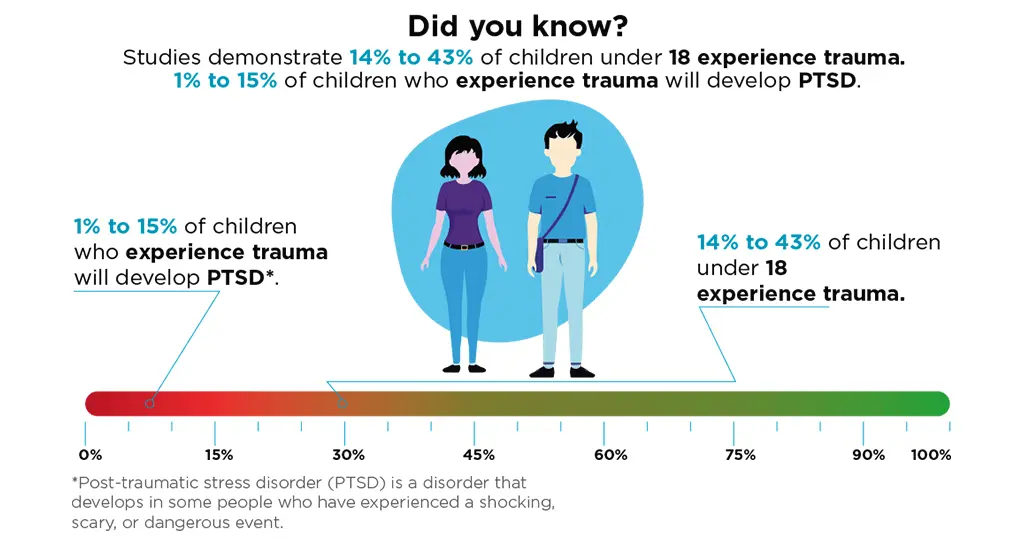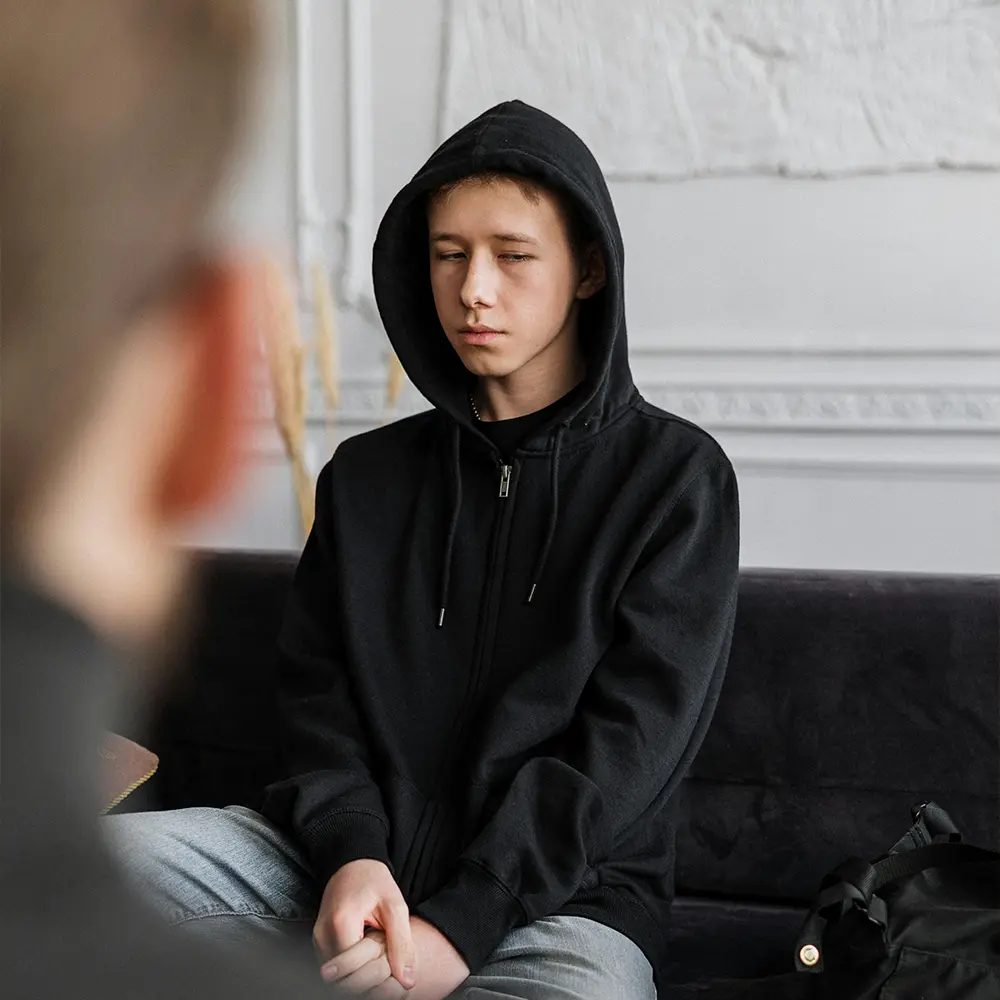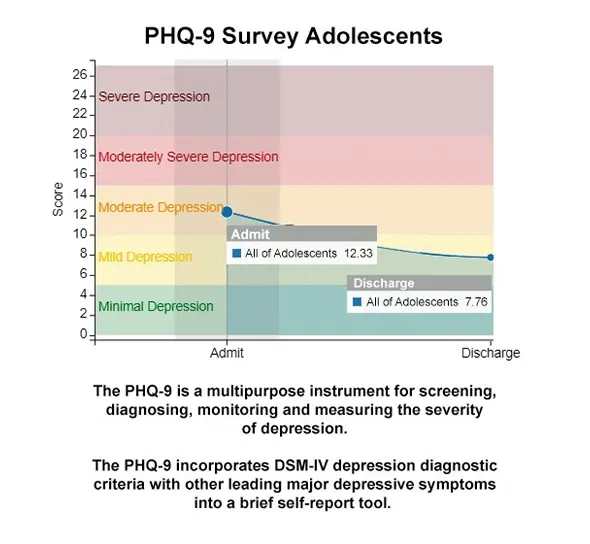PTSD Treatment for Adolescents
PTSD (Post-Traumatic Stress Disorder) is a complex condition that causes an individual’s brain to fixate or get stuck in a fear state or danger mode. PTSD in teens is far from uncommon, but can have life-altering ramifications and can significantly impair their ability to succeed in the world. Fortunately, there is treatment available. SunCloud Health treats adolescents struggling with post-traumatic stress disorder through individualized treatment plans utilizing our proven integrative model.
Video: Why Treating Trauma Is Essential in Adolescent Recovery
The Importance of Prompt Mental Health Care
Did you know that studies demonstrate 14% to 43% of children and adolescents under 18 experience trauma, and 1% to 15% of children who experience traumatic events will develop PTSD? The good news is teen PTSD treatment will help teenagers regain their self-confidence, trust, and healthy outlook on life.
Read on to learn more about PTSD and how SunCloud Health’s group of experts can help teens resolve the debilitating internal conflicts caused by PTSD. Please contact us for an assessment to determine if our offerings are the right fit for the needs of your child, patient, or student.

Does My Child Have Mental Health Issues Related to Teen PTSD?
PTSD is relatively common in teenagers who have experienced trauma, with 1% to 15% of teens with trauma developing PTSD. Many teenagers who develop post-traumatic stress disorder have lived through an ongoing traumatic experience such as neglect, physical abuse, domestic violence, sexual assault, sexual abuse, or mental abuse. Other teenagers develop PTSD from witnessing a natural disaster or experiencing a loss, such a death in the family or the death of a close friend.
The difference between teen PTSD vs. teen trauma is that teen trauma is the experience of the trauma while teen PTSD is a mental health condition that develops because of the trauma experience. The National Institute of Health found that 5% of teenagers between the ages of 13-18 had severe impairment due to teen and childhood PTSD.
Why Treat PTSD in Teens?
Treating teenage Post-Traumatic Stress Disorder (PTSD) is important, because PTSD is often a recurring mental condition. If teenagers experiencing trauma or are exhibiting trauma symptoms after living through traumatic events are not treated properly and a full recovery is not made, there is a strong possibility of the disorder returning. When they enter treatment specifically for PTSD, they are more likely to make a full recovery.
Video: What to Look for in Treatment for Your Child?
Dr. Alexander Chevalier, Medical Director, Child and Adolescent Psychiatry at SunCloud Health, gives parents helpful advice on what to look for when considering treatment centers their child after experiecing trauma.
One of the most formative and difficult times in our lives are those teenage years. Teenagers are experiencing stress, anxiety, mood shifts, hormone changes, peer pressure, identify questions, and so many other stressors. Teenagers who are able to get treatment early for PTSD can avoid developing some of the more severe symptoms. If your teen has experienced a traumatic event or exhibited symptoms of childhood trauma or PTSD, it’s time to help them help themselves through a qualified PTSD treatment center.
When teenagers enter treatment specifically for PTSD, they are more likely to make a full recovery. Let them know they are not alone when experiencing PTSD symptoms.

What are the Symptoms of Teenage PTSD?
Teenagers are an age group where pouting, sulking, and mood shifts are common. Symptoms of teenage PTSD can be tricky to spot and we recommend parents bring in any teenager who has had exposure to a traumatic event. As time goes on, treating PTSD is more and more difficult, so it’s important for parents who notice distressing symptoms of PTSD in their teenagers to seek treatment immediately.
These are the most common trauma symptoms that parents notice in teens at home:
- Flashbacks
- Nightmares
- Anxiety attacks and panic attacks
- Insomnia
- Difficulty making decisions
- Aggressive behaviors or irritability
- Lack of enjoyment in activities they used to love
- Constantly “on edge”
- Highly emotional responses
- Avoiding the place or people where the traumatic event occurred
- Emotional numbing where emotions are not discussed or displayed, “zoning out”
- Inappropriate anger or quick to anger
- Detachment from friends and family, self-isolating
PTSD typically does not resolve on its own, but worsens over time and can reoccur if it does spontaneously resolve itself. Treatment is the only way to ensure that your teenager can reclaim their life after experiencing a traumatic event. Teenagers who do not receive treatment have difficulty living a fulfilling life and are often mistrustful of others, exhibit low self-esteem, suffer from depression and anxiety disorders (or other mental disorders), experience suicidal thoughts, and may engage in self-destructive behavior such as substance abuse.
Should You Get Professional Counseling/Treatment for Teenagers Who Have Experienced Trauma?
PTSD is a serious mental health disorder and it is best treated by a specialist. If you had a severe heart condition, you would go to a cardiologist and not to your general practitioner for surgical treatment. The same theory applies to PTSD treatment. Post-traumatic stress disorder is a more severe condition and our specialists can provide multiple modalities of treatment, carefully constructed to fit each individual’s unique treatment needs.
Some parents believe that their teenager can find teen PTSD treatment through their school guidance counselor. This approach can feel more comfortable because of the informal setting; however, school guidance counselors do not have the necessary training to treat adolescents who have suffered traumatic experiences. The primary challenge is that the school counselor rarely has the necessary qualifications to treat PTSD.
With PTSD, it’s important to note that each person will need individual treatment and one modality may not be a fit for each teenager. Most PTSD programs begin with CBT (Cognitive Behavioral Therapy) because of its efficacy, which includes cognitive restructuring and exposure therapy. CBT is not a requirement for school counselors and even those who have trained in CBT typically use that training to help students with social anxiety. Furthermore, PTSD can be particularly difficult for teenagers because many have difficulty sharing with their therapist about the traumatic event. Sharing with a school guidance counselor can feel uncomfortable because the student may see the counselor in school after treatment or worry about other students listening in.
This is why mental health care by trained professionals is of the utmost importance to properly treat trauma. Our facilities and settings at SunCloud Health are private and comfortable, and all of our teen therapists are trained in all major PTSD treatment modalities because experience in treating trauma is critical when it comes to therapists helping teens make a full recovery. We work with teenagers in the way that feels most comfortable to them.
Video: WHAT QUESTIONS PARENTS SHOULD ASK A TREATMENT PROVIDER?
Dr. Alexander Chevalier, Medical Director of Child and Adolescent Psychiatry at SunCloud Health, details the questions a parent or family member/guardian should be asking when looking for a treatment provider.
Video: DOES IT MAKE SENSE TO PULL MY KID OUT OF SCHOOL FOR TREATMENT?
Hear from Dr. Chevalier on the balance school and extracurricular activities with treatment. In most cases, coursework is unaffected and can be improved while a student is out of school receiving treatment.
Trauma-informed care is the only way to ensure that your teenager can reclaim their life after experiencing a traumatic event. Let them know they are not alone.
Teen PTSD Treatment at SunCloud Health
PTSD treatment gives children and adolescents who have experienced trauma a fresh start. National averages for recovery are 20% of all cases recovering within 3 months and 50% of all cases recovering within 24 months (with treatment). The full timetable for recovery depends on several factors including the nature of the cause(s), current mental state, participation and finding the proper treatment modalities.
Adolescent PTSD therapy at SunCloud Health makes use of multiple modalities with our proven integrated model and techniques. We approach teen PTSD treatment from a number of therapeutic angles to create a customized plan that is best suited to the teen’s needs, in an environment focused on acceptance for every individual who walks through our doors.
Treatment centers around process groups, where teens are encouraged to talk and work together to gain insight into their struggles and learn how to work through them, as well as skills-based groups like:
- Dialectical Behavioral Therapy (DBT)
- Trauma-focused Cognitive Behavioral Therapy (CBT)
- Acceptance Commitment Therapy (ACT)
- 12 Steps
- Talk therapy
- Art therapy
- Family therapy
Plans are group focused so clients can share similar experiences and relate to one another even if they have varying diagnoses (such as co-occurring substance abuse, depression, or anxiety disorders), build coping skills for long-term recovery, and build up their community, peer, and parental support system both during and after treatment. We offer education for family members as well to continue that support after the teen completes their program.
These trauma-focused therapy sessions are led by an experienced team of psychiatrists, registered dieticians, psychologists, and therapists who specialize in a wide range of adolescent disorders. We take a dual-diagnosis approach, treating co-occurring disorders as well as identifying and treating the underlying root cause of each issue. Our goal is to help teens feel empowered, supported, and connected, building healthy skills that will stay with them for a lifetime.

Adolescent Post-Traumatic Stress Disorder Treatment Programs at SunCloud Health
SunCloud Health offers both Partial Hospitalization Programs (PHP) and Intensive Outpatient Programs (IOP). Our PHP runs Monday through Friday from 9am-3:30pm, while our IOP is available three to five times weekly from 4-7pm. Both programs are available at our Naperville, Chicago, and Northbrook centers. Designed for adolescents requiring varying levels of support, we provide dedicated time for schoolwork and maintain direct collaboration with their schools.
Has your child experienced trauma? The sooner PTSD is addressed in children and adolescents, the sooner your teenager can fully engage in life.Get your teenager the PTSD treatment that they need due to current or past trauma.
From admit to discharge, we see an aggregate improvement in our adolescents as measured by the PHQ-9. Lower scores reflect an improvement.

